- Home
- Steven Becker
Wood's Harbor Page 3
Wood's Harbor Read online
Page 3
“Maybe you did the right thing. But you can’t be throwing the money around.”
He nodded, but Mac was sure the reasoning was lost on the free spirit.
“What about Mel? Have you seen her?”
Trufante shook his head. “Went by there, but they got a new sheriff in town. Mean old boy come down from somewhere up North to take over for Jules. Big ol’ sucker was sitting right in front of her room. I took one look and high-tailed it out of there.”
“What happened to Jules?” Mac asked.
“Guess you haven’t seen a paper or heard the news. She resigned. Between the fires and the bodies, it was more than she could explain.”
Mac stared at the ground, thinking about the collateral damage to his friend. She had gone out of her way to help him and now was out of a job. “Where’s she at?”
He shrugged his shoulders. “The last thing I do is keep an eye on the law if the law isn’t keeping an eye on me. Probably holed up with that girlfriend of hers. Heard she got work in Miami.”
Mac remembered Heather. Maybe he should track her down and apologize to Jules. Or maybe it was better just to stay dead. “We gotta go,” Mac started walking to where he had parked.
“What about my bike?”
“Stash it. You’re in no condition to drive anyway. The last thing I need is for you to start singing the blues in jail.” Mac continued to walk, looking over his shoulder every few steps to make sure Trufante was behind him. They reached Annie’s Jeep and climbed in. “First thing is to shut down that party of yours before that new sheriff realizes it’s you and makes your acquaintance. I heard those North Florida crackers are some tough bastards.” It was hard for outsiders to understand, but the further north you went in Florida, the further south you got. Most towns north of Orlando, especially in the interior, were right out of Deliverance.
“What then?” Trufante asked as he tried to fit his frame into the passenger seat.
“Where’s the boat at?”
Trufante squinted at him.
“You did the right thing getting rid of it, but there was a bag I stashed on it that might come in handy about now,” Mac said. He looked at his empty wrist. “What time is it?”
Trufante took his phone from the pocket of his cargo pants and glanced at the screen. “It’s almost eleven. Figure this time of day it takes an hour and a half to get back to Marathon. Can’t afford any bad blood with my favorite barmaid.”
He almost laughed. The only time Trufante was punctual was when there was alcohol involved. “Where am I going?” he asked.
FIVE
Mac followed Trufante’s directions and pulled onto North Roosevelt, heading east towards Stock Island. Trufante directed him past Garrison Bight, the largest marina on the island, and they drove another quarter mile or so before pulling into the parking lot of a vanilla-looking commercial building. Mac drove slowly around back, cautious that he didn’t get too close if someone was still there. Despite the reputation of chop shops as being late night businesses, he doubted there was work going on this time of night. The noise would carry and attract attention. Parked in back were several boats on trailers by a large roll-up garage door. A sign above declared the business as Custom Boats and Watersports. There were no lights or cars, so they parked, got out of the car and walked to the office door, careful to stay in the shadows of the trailered boats, in case there were surveillance cameras.
“They don’t just tow these to the public ramp. It’s too visible.” Mac said, wondering how the operation worked.
Trufante pointed to a camouflaged gate across the parking lot that looked like it went nowhere. “That there goes back to a lagoon. You got to run the bridge at the bottom of the tide, so no one thinks you can get in or out of here. They’ve got a forklift inside,” he pointed to the garage door. “Ain’t but a hundred yards to the water. The clean boats go out the front door on trailers, the dirty ones out the back, into the lagoon, where they can disappear in the back country.”
Mac slid against the building to the office door. It was solid glass, allowing him an unobstructed view of the interior. In the dim blue light from the computers he saw several desks and the usual assortment of office furniture. There was no sign of life.
“How we gonna get in?” Trufante asked.
Mac pulled the handle on the commercial-grade door, finding the deadbolt in place. He left the storefront and walked to a solid door on the other side of the garage door used to access the workspace. The steel door had a single lock and he yanked the handle, finding it locked as he expected, but it was old, and anything made out of metal in the Keys had a half-life, its useful life shortened by the weather and salty environment. A cinder block lay to the side of the door, probably used for a door stop. Mac picked up the block and raised it over his head. With a quick movement, he brought the cement block down on the handle. He felt the lock shatter, and satisfied he could get in now, he set the block back and went to work on the lock. He picked up the handle from the ground and inserted it back into the mechanism. With a few jiggles, he was able to coax the door open.
“Open the garage door,” he called to Trufante and walked into the cavernous space. At least five boats were in the warehouse, many in different stages of assembly, or disassembly, in which this business specialized. None resembled Commando’s boat. The two closest to the garage door looked workable. A Hydrosport 33 sat on blocks, its three 275 horsepower engines gleaming in the moonlight. A stainless steel structure lay next to it. The boat would work, but would also stand out. Although he would have liked the speed and shallow draft, the go-fast boat would be too easy to spot. The three boats in the back had no engines so he focused on the Scout. The graceful but utilitarian lines appealed to him and the twin 225 Yamaha engines were adequate power for the twenty-seven foot hull.
“Open the garage door,” he repeated.
“What for?” Trufante asked.
“Change in plans. You’re gonna take the car back to Annie and I’m taking a boat back to Wood’s place. There’s no sign of Commando’s boat and I need to gear up.”
“Reckon the safest place to steal a boat is from a boat thief. They ain’t going to the police,” Trufante said and pulled on the chain next to the door.
Mac cringed as metal creaked and the garage door went skyward, disappearing into its housing. Moonlight flooded the space. After a quick inspection of the boat, he decided it would work. The only thing he could see missing was the leaning post, but the open space in the cockpit didn’t bother him, in fact it might be useful. He used the short work ladder next to the hull to climb inside. The keys were in the ignition - a relief, as he wasn’t prepared to hot-wire the boat - but there was a large hole in the dashboard where the chart-plotter belonged. That was unfortunate. Newer boats used a large display with the GPS, plotter, radar and depth finder included in one unit. Some had redundant systems, but the dashboard had only the factory tachometers, oil pressure gauges for the twin engines, and a bank of switches for the navigation lights, bilge pumps, wash-downs and other small electric devices. Rather than risk the noise of dry-cranking the engines, he turned on the navigation lights. He could see the red and green light reflected from the bow. There would also be a white light on the hardtop, but for now he was satisfied the batteries were installed and charged.
“Start the lift,” he called to Trufante.
The Cajun climbed into the seat of the propane-powered forklift and the engine purred. Propane lifts were cleaner and quieter than their gas counterparts and Mac was again thankful for the criminals’ forethought. They also needed to get the boats in the water with little noise. He jumped down from the hull, moved the ladder out of the way, and cleared the parts and tools in the path of the lift. Trufante moved the extended forks into place under the chines and lifted the boat. Once free of the blocks, the forklift backed silently out of the space, its backup alarm thoughtfully disabled. Mac closed the garage door and ran to open the gates as Trufante swung the lift around,
but they were locked. He had to run into the building again and search the office for the key. He found it on a hook by the door and ran back out to Trufante, who now had the boat facing forward, ready to roll through the opening. Mac unlocked the padlock, threw open the gate and stood back as Trufante drove the lift down the path to the water.
He moved through the brush beside the trail to get in front of the boat and saw the lagoon ahead. Another minute and Trufante had the boat extended over the water, where he lowered the hull until it was ready to float off the padded forks. Mac jumped into the boat and turned the keys. He was greeted by silence and checked the throttles, cursed, and then remembered the dead-man’s switch. The hook-like keys were not engaged, defeating the starter. He fumbled with the safety mechanism, his fingers shaking, until the hooks clamped onto the posts and engaged. Again he turned the key to the starboard motor, cringing while the safety beeped, but the motor turned over and caught. He started the port engine, pulled the throttles back and reversed the boat.
“Put the lift back and leave the place like we found it,” he called back to Trufante, who was already backing the lift down the trail. While he waited, he flipped switches until he found the backlights for the instrument panel and checked the fuel. The gauge showed a quarter full, but unlike cars, fuel indicators on boats were seldom accurate. There could be three quarters, or nothing in the tank. Calculating the worst case and assuming the boat held a few hundred gallons, he estimated with a quarter-tank they could make fifty miles if they didn’t push too hard.
Trufante ran down the path towards him and he brought the boat forward. “Take the car. I’ll meet you in Marathon in the morning.”
The Cajun stopped short. “I ain’t driving that road in this condition.”
Mac saw the Cajun’s hands shaking in the moonlight and realized he was right. He would have to take him. “Can you get the car back to the Bight.” The marina was only a few blocks away and her car would blend in there. “I’ll meet you there.”
Mac paused, realizing he was moving too fast. With the characters involved here, the slightest misstep could get someone killed. He would have to slow down and be more careful. He checked his wrist out of habit, but the dive watch had been lost in the wreckage. With a glance at the moon, he figured it was close to one. Annie would be expecting him back in an hour. “Call her and tell her to take a cab or whatever - I’ll pay her back.”
Without waiting for an answer, he put the port engine in reverse and nudged the starboard throttle into forward. The boat started to spin. When it faced the bridge, Mac pushed both throttles to the idle stop and slowly motored to the skinny opening between the water and steel structure of the bridge. He glanced back. Trufante was gone. He looked up at the T-top over his head and then at the bridge above, trying to gauge whether the boat would fit. There were likely several antennae and possibly a radar bell mounted to the top, invisible from below. Without the electronic console, they were expendable. He held his breath as the boat approached the bridge. Trufante had said they brought the boats out at low tide. It was far from that now, the late summer moon bringing two and a half feet of water into the lagoon. He guessed this was not the tallest boat they’d brought through here, and with no choice, he eased the boat under the bridge. The bow fell into its shadow and the hardtop followed. He heard an antenna drag and then snap as it broke off and fell into the murky water. Another crack and the radar dome followed, but the leading edge of the hardtop was in the clear.
The boat cleared the obstacle and he pushed the throttles slightly, looking behind at the small wakes as the boat picked up speed. Mangroves blocked the opening, but he sensed where the main channel was and steered towards the area where the water seemed to be moving fastest. Branches brushed the boat as it exited the lagoon, but he knew he was in the right spot when they opened slightly, revealing clear water ahead.
Without the electronics, he had no idea how deep the water was. Finally the high tide would be to his advantage here. The lack of houses and docks lining the shore told him the water was not navigable. Just as he thought it, the lower units brushed the bottom, but his instincts automatically moved his thumb to the buttons on the side of the throttle handle. A small motor whined. He watched the engines lift from the water. He didn’t expect the hull to ground, but the deep draft of the 225 HP motors was a problem. Slowly he raised the twin engines, watching the water stream from the small exit holes that showed the units were cooling as they lifted from the dark water. The stream of water continued to flow and the tips of the propellers were just visible when he released the control button and breathed out. The boat continued at an idle across the flat. He cut the wheel to the left and headed for the security of the houses on the seaward side of the Bight, the boats moored on their seawalls a sure sign there was deeper water. With the motors back down, he idled through the narrow cut and into the protection of the harbor. A quarter mile away, five docks jutted out from the seawall directly in front of him. He steered towards the middle, looking for a place to tie off and wait for Trufante.
***
Yesterday, Norm had the driver drop him at the marina just off the Palm Avenue Causeway where he had returned the rental boat after carefully cleaning any sign of the struggle with Jay. Dutifully lowering his head, he had taken the scolding from the manager about the missing antenna, the object he had used to stab his accomplice with, and gladly offered to pay for the damage. The marina was deserted now, the only signs of life were the lights coming from the cabins of a few live-aboards. He walked down the jetty to the dock where the rental boats were kept and studied each boat in the glow of the dock lights, checking the numbers on the hulls. The boat he had rented was towards the end of the row. The deckhand had instructed him to leave it at the gas dock when he returned, so he assumed it was full of fuel. He released the bowline and jumped on board, pulled the key from his bag and inserted it into the engine. There were two days remaining on the rental contract and he had insisted on keeping the keys, promising to return them before he left the island. Boats could be more useful than cars here, and with the rental paid in full, he might as well have the use of the boat.
He lowered his head after seeing a car pull up and park on the seawall. Caught full-on in the headlights, he felt like someone was staring at him. He started the engine and glanced back at the car; the silhouette of a tall man reminded him of someone, but he couldn’t place him. The headlights shut off and the fifty foot distance seemed to disappear and he recognized the tall, lanky frame, long, stringy hair, and the gleam from the smile in the dock lights as the man looked right at him. With increased urgency, he went to the rear cleat, threw off the dock line, returned to the helm and backed the boat out of the slip. The man stood there staring at him and he pushed the throttle down, ignoring the idle speed signs and speeding past the line of power poles that led to the harbor exit.
SIX
Mac looked away from the unmistakable silhouette of Trufante standing on the dock to turn his attention to a rental boat coming straight at him. He turned hard to starboard to avoid the boat, staring through the dark at the driver. Once the boat passed, he idled to the middle dock and coasted to a stop. “Over here,” he yelled to Trufante.
Trufante turned and ran to the boat. “It’s him!” he yelled and jumped on the board. “The CIA douche from the island.”
Mac didn’t answer. He had already noticed the logo on the rental boats was the same as the boat that had chased him several days ago. It was too dark to see who had almost collided with him, but it was suspicious for a rental boat to be leaving in the dark of night. With no other leads, he couldn’t ignore the coincidence. He pulled back on the throttles, turned the boat and followed the channel out of the harbor. The other boat had already passed the breakwater, but there was only one long channel to deep water and with no other boats, Mac knew he would be able to see where the boat went.
“What’cha doin’?” Trufante asked.
Mac had stopped by an older out
board tied up at the end of the pier. “Get their gas cans.” He worked the throttles and idled next to the older boat. By its age and design, he guessed it would likely not have a permanent tank, but use portables. Worried about the fuel level in the Scout, there was no use in chasing the other boat if he ran out of gas.
Trufante sat on the gunwale waiting for Mac to close the distance between the boats. When they were within a foot, he swung his legs into the other hull and slid into the boat. Mac waited while he removed the fuel line from the first tank and lifted it. He went to the side and held the boats together while Trufante hefted the tank onto the boat. Mac set it on the deck, guessing by its weight it was near full. He slid the tank to the transom and waited while the Cajun lifted the other tank, not sure if it was full or Trufante was still drunk from the way he struggled to get it across the void and onto the boat. Mac set the second tank by the first and waited while Trufante climbed back across the gunwales before backing away from the dock and turning towards the harbor exit. The other boat would have a head start, but the Scout was faster and he could easily catch him in open water, if the need arose. For now, he was satisfied to follow at a distance.
He turned to port and followed the channel running parallel to land. The other boat was still visible further out against the backdrop of Fleming Key. “Top off the gas tank,” he ordered Trufante, wanting the advantage of the protected waters and slower speed for the operation. The smell of gas wafted towards him as Trufante struggled with the heavy containers. He looked back and slowed to idle speed, giving Trufante a better chance of pouring the gas into the small hole, just large enough for the nozzle of a gas pump. The Cajun emptied the first can, tossed it aside, and started dumping the fuel from the second. Mac calculated the range of the boat while Trufante filled the tanks. With the additional twenty gallons, he figured he had another fifty miles, maybe more. If he could keep the engines in their comfort zone, they would have a range of over a hundred miles. Trufante tossed the second tank to the deck.

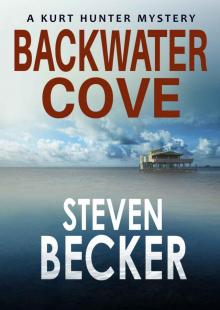 Backwater Cove
Backwater Cove Storm Surge: A Fast Paced International Adventure Thriller (Storm Thriller Series Book 3)
Storm Surge: A Fast Paced International Adventure Thriller (Storm Thriller Series Book 3)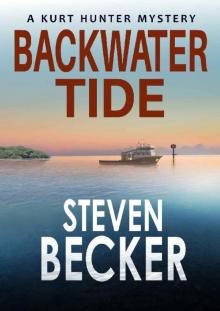 Backwater Tide
Backwater Tide Backwater Pass
Backwater Pass Backwater Flats
Backwater Flats Wood's Revenge
Wood's Revenge Haitian Gold
Haitian Gold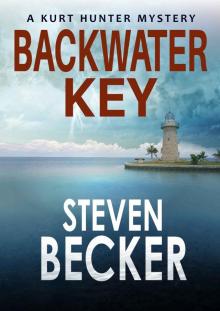 Backwater Key
Backwater Key Wood's Tempest
Wood's Tempest Uncharted Waters
Uncharted Waters Tuna Tango
Tuna Tango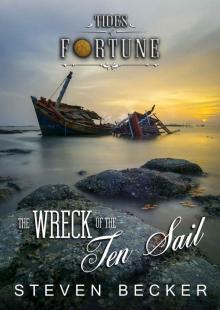 The Wreck of the Ten Sail
The Wreck of the Ten Sail Backwater Bay (Kurt Hunter Mysteries Book 1)
Backwater Bay (Kurt Hunter Mysteries Book 1) Storm Clouds
Storm Clouds Wood's Wall
Wood's Wall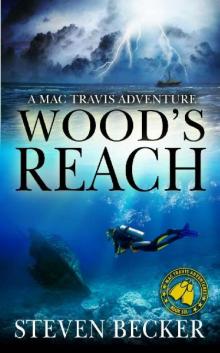 Wood's Reach
Wood's Reach Wood's Fury
Wood's Fury Storm Rising
Storm Rising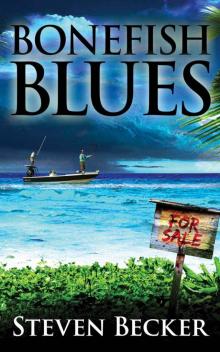 Bonefish Blues
Bonefish Blues Wood's Harbor: Action & Sea Adventure in the Florida Keys (Mac Travis Adventures Book 5)
Wood's Harbor: Action & Sea Adventure in the Florida Keys (Mac Travis Adventures Book 5) Wood's Reach: Action & Sea Adventure in the Florida Keys (Mac Travis Adventures Book 6)
Wood's Reach: Action & Sea Adventure in the Florida Keys (Mac Travis Adventures Book 6) Wood's Wreck
Wood's Wreck Wood's Harbor
Wood's Harbor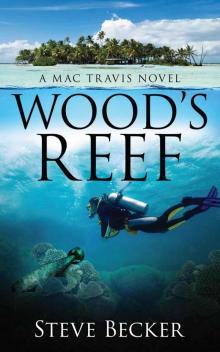 Wood's Reef
Wood's Reef Backwater Bay
Backwater Bay